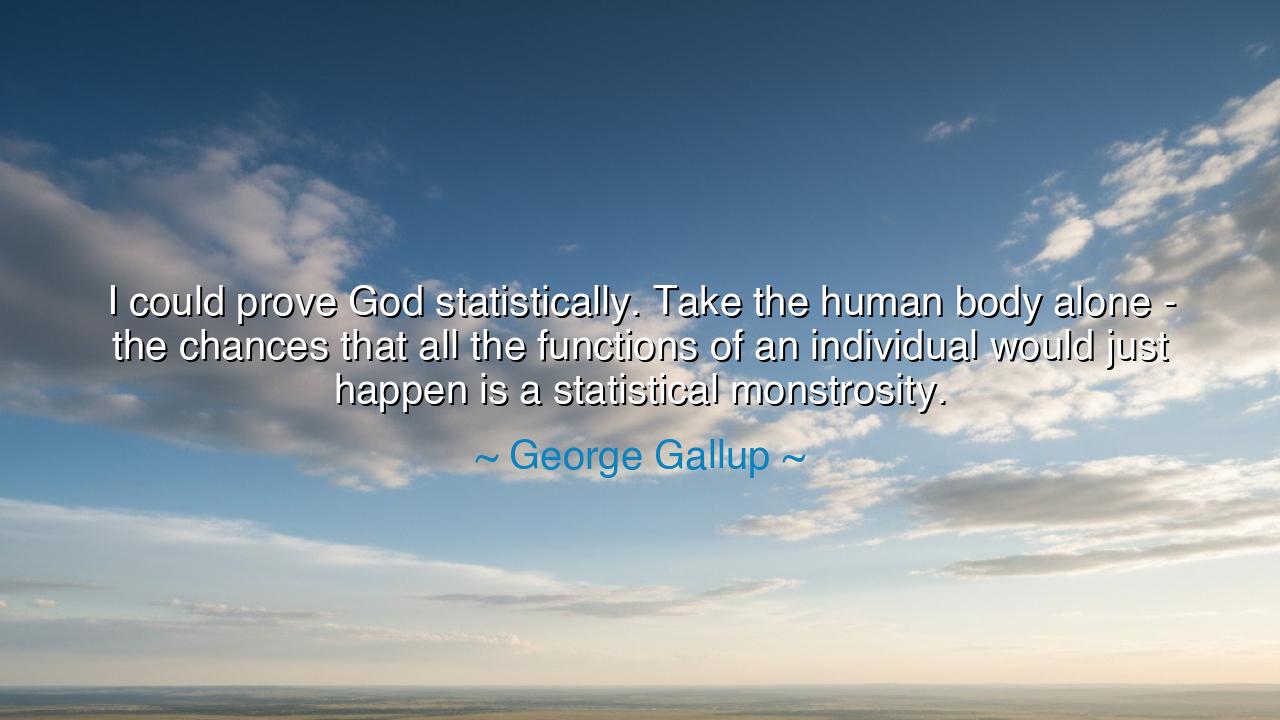
I could prove God statistically. Take the human body alone - the
I could prove God statistically. Take the human body alone - the chances that all the functions of an individual would just happen is a statistical monstrosity.






“I could prove God statistically. Take the human body alone — the chances that all the functions of an individual would just happen is a statistical monstrosity.” — thus spoke George Gallup, the great pioneer of modern polling, whose life was dedicated to the science of numbers, yet whose heart still bowed before the mystery of creation. In this profound statement, Gallup bridges two worlds often seen as opposites: faith and reason, science and wonder. His words remind us that even amid the precise calculations of probability and data, the divine order of life stands radiant and undeniable. What he saw in the balance of statistics was not chaos, but design — not randomness, but the unmistakable trace of a higher intelligence.
George Gallup, founder of the Gallup Organization, spent his life studying human behavior through the lens of numbers. He measured opinion, preference, and belief, translating the movements of the human heart into percentages and probabilities. Yet, despite his devotion to logic and evidence, he remained a man of faith. His statement — half scientific, half spiritual — arose from a profound realization: that when one examines the complexity of life, from the cell to the soul, the likelihood of it being a mere accident defies reason. The human body, with its synchronized systems — the heartbeat, the breath, the brain, the very pulse of thought — seemed to him an orchestration too precise to belong to chance.
When Gallup speaks of a “statistical monstrosity,” he means that the odds of life emerging from randomness are so vast, so impossible, that they defy the very laws of probability. For him, mathematics did not diminish the divine; it magnified it. The deeper he looked into numbers, the more he saw order — and in that order, intention. It is a sentiment echoed by many great thinkers across the ages. Isaac Newton, after uncovering the laws that govern the heavens, declared that the universe revealed the “handiwork of a divine Creator.” Albert Einstein, though not a man of organized religion, confessed that the harmony of the cosmos inspired in him “a sense of awe and humility before something greater.” Gallup joins this lineage of minds who, through logic itself, found reason to believe in wonder.
The human body — the focus of Gallup’s example — is itself a living testament to this mystery. Within each person, there beats a heart that never rests, a brain that commands a symphony of thought and motion, and a network of trillions of cells, each performing its sacred duty in silence. The odds of these systems forming by mere coincidence, working in perfect unison to sustain consciousness, are indeed infinitesimal. Consider the eye — a marvel of precision, capable of perceiving light, color, depth, and beauty. Consider DNA — a code of life written in an alphabet of molecules, containing the instructions for all living things. To Gallup, such wonders were not statistical curiosities but proofs of divine design, written in the language of probability itself.
Yet his words reach beyond science; they touch the human soul. For if life itself is so miraculous, then every breath is a gift, and every person a masterpiece of infinite care. To recognize this is to walk through the world with reverence, to see not randomness, but meaning in every moment. It is to stand in awe before the vastness of creation, and to feel, as the ancients did, that we are part of something both immeasurable and intentional. Gallup’s insight is not a sermon of dogma, but a hymn of gratitude — a reminder that even in an age of numbers, the greatest truth remains beyond calculation.
Consider the example of Louis Pasteur, the father of modern microbiology, who said, “A little science distances you from God, but much science brings you back to Him.” Pasteur spent his life peering through microscopes, unraveling the mysteries of life too small for the naked eye — yet the more he discovered, the more he was convinced that divine intelligence was woven through every fiber of existence. Like Gallup, he found faith not by ignoring evidence, but by examining it deeply. Both men saw that the deeper one descends into truth, the brighter the face of the Creator becomes.
Lesson: Let the miracles of creation humble and awaken you. When you behold the human body, the stars, or the turning of the seasons, do not dismiss them as chance, but as whispers of divine intention. Study the world — through science, through art, through reflection — and let your discoveries lead you not to arrogance, but to awe. For the truest wisdom unites both faith and reason, recognizing that knowledge without wonder is cold, and wonder without understanding is blind.
Thus, in George Gallup’s words, we find a bridge between the measurable and the immeasurable, the seen and the unseen. He teaches us that statistics, when gazed upon with an open heart, do not diminish the mystery of God but confirm it. The universe, he suggests, is not an accident but a mathematical symphony — and we, its living notes, are proof that creation itself was no roll of the dice, but a masterpiece of purpose.






AAdministratorAdministrator
Welcome, honored guests. Please leave a comment, we will respond soon